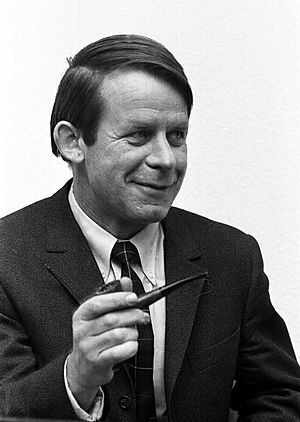Siegfried Lenz facts for kids
Quick facts for kids
Siegfried Lenz
|
|
|---|---|

Lenz in 1969
|
|
| Born | 17 March 1926 Lyck, Germany; now Ełk, Poland |
| Died | 7 October 2014 (aged 88) Hamburg, Germany |
| Occupation | Novelist |
| Nationality | German |
| Alma mater | University of Hamburg |
| Period | 1956–2014 |
| Notable works | The German Lesson |
| Notable awards |
|
Siegfried Lenz (17 March 1926 – 7 October 2014) was a famous German writer. He wrote many novels, short stories, and essays. He also wrote plays for radio and the theatre. Lenz received the important Goethe Prize in 2000. He also won the International Nonino Prize in Italy in 2010.
Contents
Life of Siegfried Lenz
Siegfried Lenz was born in Lyck, which was then in East Prussia, Germany. Today, this town is called Ełk and is part of Poland. His father worked as a customs officer. After finishing school in 1943, Siegfried was called to join the German navy, known as the Kriegsmarine.
During World War II, he served as a soldier in the German navy. He was an officer cadet on ships like the Admiral Scheer. Near the end of the war, he left the military. He was briefly held as a prisoner of war in Schleswig-Holstein. After this, he worked as an interpreter for the British army.
Education and Early Career
Lenz later studied philosophy, English, and literary history at the University of Hamburg. However, he stopped his studies early. He became an intern at a newspaper called Die Welt. He worked there as an editor from 1950 to 1951. At the newspaper, he met Liselotte, who he married in 1949.
In 1951, Lenz earned money from his first novel, Habichte in der Luft (which means "Hawks in the Air"). He used this money to travel to Kenya. While in Kenya, he wrote a short story called "Lukas, sanftmütiger Knecht" ("Luke, Gentle Servant"). This story was about the Mau Mau Uprising happening there.
Writing and Political Involvement
After 1951, Lenz became a full-time writer in Hamburg. He joined a group of writers called Group 47. He also became involved with the Social Democratic Party. He supported efforts to improve relations with Eastern European countries.
He was part of the German group that signed the Treaty of Warsaw (1970). In 2011, he was made an honorary citizen of his hometown, Ełk. This town had become part of Poland after the 1945 Potsdam Conference.
In 2003, Lenz joined a group that wanted to keep German spelling rules the same. This group was protesting against changes made to German spelling in 1996.
Later Life and Passing
His wife, Liselotte, passed away in 2006 after 57 years of marriage. Four years later, he married his neighbor, Ulla. She had helped him after his first wife's death. Siegfried Lenz died in Hamburg on 7 October 2014, at the age of 88.
After he passed away, a novel he had written in 1951 was found and published. It was called Der Überläufer ("The Turncoat"). This book was about a German soldier who joined the Soviet forces.
Siegfried Lenz Honors and Awards
Siegfried Lenz received many important awards during his life. In 1988, he was given the Peace Prize of the German Book Trade. This award is presented every year at the Frankfurt Book Fair. He also received the Goethe Prize from Frankfurt am Main in 2000.
A year later, he was given the highest honor in Hamburg: honorary citizenship. In 2004, Lenz was named an honorary citizen of Schleswig-Holstein. In 2011, he became an honorary citizen of his hometown, Ełk. He also won the Italian International Nonino Prize in 2010.
Siegfried Lenz Prize
The Siegfried Lenz Prize is a special award given every two years in Hamburg. It is managed by the Siegfried Lenz Foundation. The prize is given to "international writers who are recognized for their stories and whose work is similar to Siegfried Lenz's style."
A group of five judges chooses the winners. The prize includes 50,000 euros, which makes it one of the most valuable literature awards in Germany. Siegfried Lenz himself started this prize in 2014, shortly before he died.
Film Adaptations of Lenz's Works
Many of Siegfried Lenz's stories and novels have been made into films and TV shows. Here are some of them:
- Man in the River (1958), based on Der Mann im Strom
- The Lightship (1963), based on Das Feuerschiff
- Zeit der Schuldlosen (TV film, 1961), based on his play
- Time of the Innocent (1964), also based on Die Zeit der Schuldlosen
- Risiko für Weihnachtsmänner (TV film, 1968), based on his short story
- Das schönste Fest der Welt (TV film, 1969), based on his play
- Deutschstunde (TV miniseries, 1971), based on his famous novel The German Lesson
- Lehmanns Erzählungen (TV film, 1975)
- Der Geist der Mirabelle (TV film, 1978)
- Ein Kriegsende (TV film, 1984), based on his story
- The Lightship (1986), another film based on Das Feuerschiff
- Heimatmuseum (TV miniseries, 1988)
- Template:The Serbian Girl (1991), based on Das serbische Mädchen
- Der Mann im Strom (TV film, 2006), another film based on this novel
- The Lightship (TV film, 2008)
- Die Auflehnung (TV film, 2009)
- Arnes Nachlass (TV film, 2012)
- High Tide Is Dead on Time (TV film, 2014)
- The Loss (TV film, 2015)
- Die Nacht im Hotel (short film, 2015)
- A Minute's Silence (TV film, 2016)
- The Start of Something (TV film, 2019)
- Deutschstunde (2019), another film based on The German Lesson
- Der Überläufer (2020), based on his novel
See also
 In Spanish: Siegfried Lenz para niños
In Spanish: Siegfried Lenz para niños
 | Audre Lorde |
 | John Berry Meachum |
 | Ferdinand Lee Barnett |

